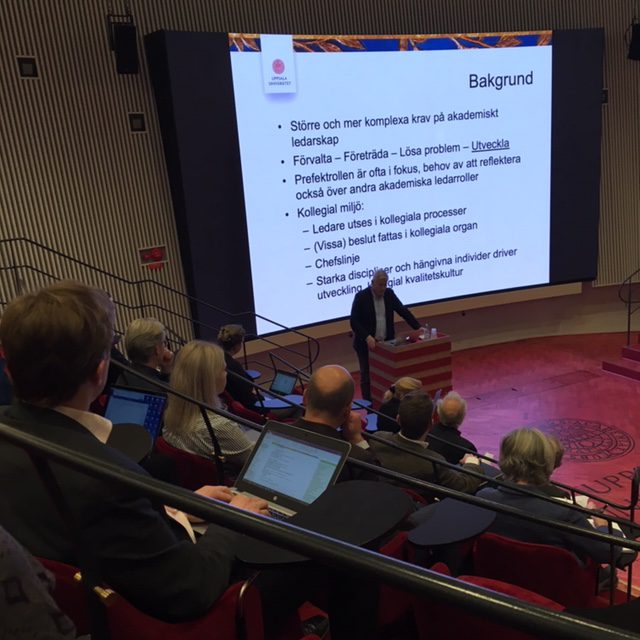At the end of last week, we had a deans meeting in the Humanities Theatre. Once per semester, the deans, vice-deans, vice-rectors, deputy vice-rectors, advisers to the Vice-Chancellor, heads of administrative divisions, the University Director, the Vice-Chancellor and the Deputy Vice-Chancellor gather for discussions. Altogether, there are about fifty of us. In the spring semester we spend a whole day together and in the autumn we have a lunch-to-lunch away day.
On these occasions, we take up topical issues. I began the meeting on Thursday by presenting ongoing developments in the University. After that, we continued with a discussion on academic leadership led by Deputy Vice-Chancellor Anders Malmberg. What does it mean to be elected by faculty colleagues? Is there scope for strategic development work? What does it mean to be a line manager or a non-line manager? How does one exercise management in an organisation of peers? Four individuals with management roles had been asked to talk about their responsibilities and their leadership and to reflect on strengths and challenges. The four were Mats Hedenius, Dean of the Faculty of Social Sciences, Eva Tiensuu Janson, Vice-Dean for Research in the Disciplinary Domain of Medicine and Pharmacy, Peter Lindblad, Vice-Dean for Collaboration in the Disciplinary Domain of Science and Technology, and Cecilia Wejryd, Adviser to the Vice-Chancellor on Equal Opportunities. They all generously shared their experiences. The discussion that followed will be continued. It could be a topic for the autumn away day.
University Director Katarina Bjelke then gave an overview of changes in support activities in recent years. The vigorous expansion of education and research has made new and increased demands on the University Administration as well. Changes in our environment and society also affect us, for example in terms of security, digitalisation and internationalisation. Many development projects are currently underway in the administration.
The morning continued with a thorough account of the government inquiry on governance and resources, given by Planning Director Daniel Gillberg. The University Board is due to submit the University’s response to the inquiry by 24 June. Our internal process has started and will continue with a seminar on 18 March in the University Main Building, which everyone interested is welcome to attend. For further information, see the Events list on the University website.
Finding solutions to the major challenges and issues in society requires a wide range of knowledge and expertise. Uppsala University is a comprehensive university offering subjects from languages to engineering and technology. How can we make the most of our great breadth? What barriers exist to cooperation across subject, faculty and domain boundaries? These were some of the questions that the afternoon discussion began with. We had presentations on three of our research centres. Claes Fredrik Helgesson presented the Centre for Integrated Research on Culture and Society (CIRCUS), Eva Garmendia told us about Uppsala Antibiotic Center (UAC) and Thomas Schön told us about the multidisciplinary centre for artificial intelligence (AI) that he is in the process of building up. Starting points, structures and organisations differ and the centres also differ in how far they have come in their development. UAC has been going for several years, CIRCUS has just begun, while the AI centre has not yet taken shape. Some similarities also emerged. Åsa Kettis presented some of the programmes that operate across subject boundaries. In the debate that followed, we concluded that more could be done to facilitate internal cooperation both in education and in research.
The topic of the final session of the day was the new Mission and Core Values document. Many different parts of the University, faculty boards and advisory boards have provided input. The deans meeting had received the latest version to read in advance. The discussion focused on the degree of specificity, ranking, target group and length of the document. However, everyone agreed that the proposal was well on the way. Deputy Vice-Chancellor Anders Malmberg, who is leading the process of revision, will take the views of the deans meeting into account. The proposal will be referred for internal consultation later this year.
All in all, it was a good day. The Humanities Theatre is an excellent venue for internal meetings as well. We look forward to continued discussions on several of the issues, perhaps at the next deans meeting. On Tuesday the Management Council will visit Aarhus University in Denmark. It will be interesting to see how they work on their Mission and Core Values, cooperation across subject boundaries, strategic development and academic leadership.

